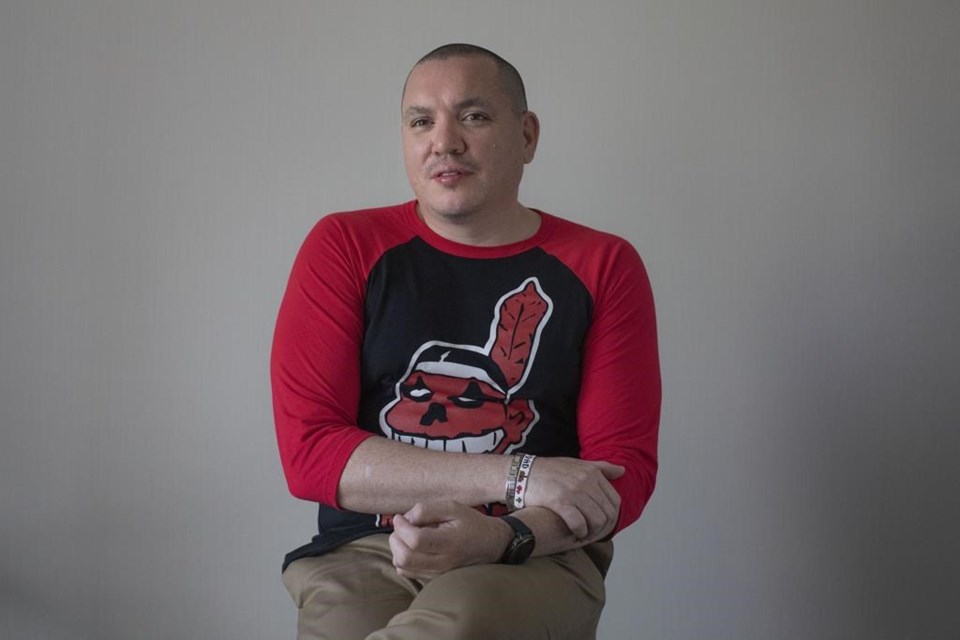TORONTO — Picture it: A plague has broken out, resulting in border closures, xenophobia, paranoia and denial of facts.
Only in this case it's a zombie outbreak, and it's infecting non-Indigenous people outside a fictional First Nations reserve that's immune to the virus.
Mi'gmaq filmmaker Jeff Barnaby says he didn't intend on making a timely pandemic movie when he wrote and directed that very scenario in the new Canadian thriller "Blood Quantum."
The film was supposed to hit theatres this Friday, but in an eerie twist of fate, its theatrical release is now postponed due to the COVID-19 crisis.
Rather, Barnaby says he was reflecting on how "we've seen all of this play out before," with outbreaks including the influenza epidemic of 1918-19.
"It was more about the societal effect of what a pandemic does to people — it makes them paranoid, it makes them xenophobic," Barnaby said in a recent phone interview from his Montreal home.
"It's like basically what you're looking at now — everybody's closing their borders, everybody is becoming fearful and paranoid of each other. The play there in 'Blood Quantum' in particular was that native people had the foreknowledge that non-natives were capable of extreme acts of destruction, and interior debate in the community became, 'Should we help these non-natives or defend ourselves?'"
The story — which stars Michael Greyeyes, Elle-Maija Tailfeathers, Forrest Goodluck, Kiowa Gordon and Olivia Scriven — is also a look at the dynamic of First Nations people within the confines of post-colonial society, Barnaby added.
"You're dealing in this situation where you're living in a culture that has been actively oppressing you, oftentimes violently. So you're asking yourself, as this post-colonial native person, 'How much do I engage in this culture? How much do I assimilate?'"
"Blood Quantum" is set on an isolated Mi'gmaq reserve called Red Crow, which becomes inundated with outsiders looking for refuge within the immune Indigenous community during the zombie outbreak.
Barnaby, whose previous projects include 2013's "Rhymes for Young Ghouls," said he wrote the film about 13 years ago.
He was inspired by his childhood memories of watching horror films as well as Alanis Obomsawin's documentary "Incident at Restigouche," about the 1981 armed Quebec Provincial Police raid on the Restigouche Reserve.
At one point in "Blood Quantum," the Indigenous community sets up blockades to keep the infected away. Such imagery is reminiscent of another part of current Canadian culture: blockades over oil and gas pipelines.
Obviously Barnaby could not have foreseen "Blood Quantum" becoming a commentary on current society, and he finds the parallels "surreal and stranger than fiction."
But Barnaby is starting to see his film as "almost like a prophecy" and a look at how history repeats itself.
"I don't think it's just going to be read and interpreted on the grounds of just being a zombie film, it was never meant to be that anyway," he said.
Rather, his audience will see parallels between his film "and people's reactions to this virus and how it's brought out basically the worst of humanity, and how it's brought into release the difference between rich people and the proletariat," he added.
Barnaby said he's still banking on a theatrical release for "Blood Quantum" before it goes to video-on-demand platforms, so it could be a while before audiences get to see it beyond its premiere at last September's Toronto International Film Festival.
But he also feels that timely films can be helpful and informative for audiences while they're experiencing that very scenario.
"The cornerstone of any really good horror story is the ability to experience it within the safety of your living room or theatre. But what happens when the horror on screen is sitting right beside you coughing into its sleeve?" Barnaby said.
"It cuts a little close to the bone. But that's typically what all my films have done. And that's what I've always wanted them to do."
This report by The Canadian Press was first published March 26, 2020.
Victoria Ahearn, The Canadian Press


